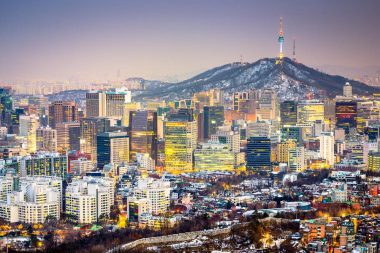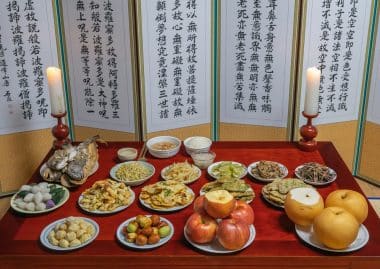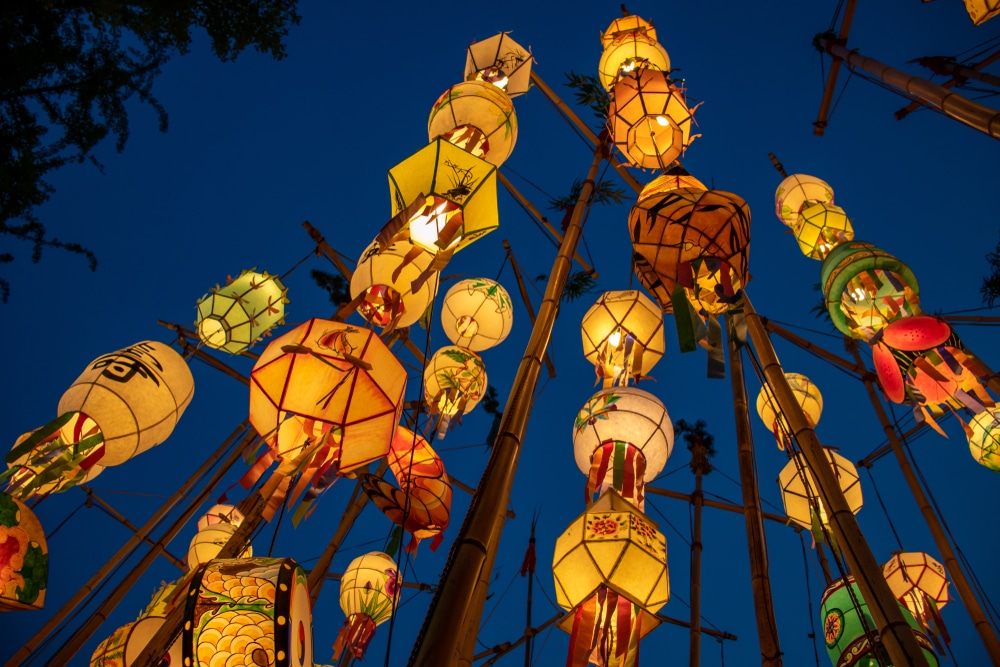Anyone who has ever experienced a festival in South Korea knows how closely these holidays are linked to the local culture. Whether it’s Chuseok, South Korea’s harvest festival that brings families together, or the Lotus Lantern Festival, which bathes cities in colorful lights, travelers can expect pure tradition and a whole new kind of sense of community and warmth. This special atmosphere leaves lasting impressions – and not only among the South Koreans. Holidaymakers who not only want to visit the country, but really want to experience it, should book their tickets according to the most important festivals.
The special importance of festivals in South Korea
In South Korea, traditions are firmly rooted in everyday life. You can feel this especially on holidays. But not in the commercial way that we now know in our Western countries. No – South Korea is all about community, family and respectful treatment of nature. And that doesn’t come out of nowhere. The life and thus the everyday life of South Koreans is strongly influenced by the three major faiths: Confucianism, Buddhism and Shamanism. How exactly? Confucianism prioritizes respect and family values, while Buddhism aims for spiritual enlightenment and shamanism involves the connection to natural forces and spirits. And these influences can be found in many rituals and also everyday life. This means that when it comes to celebrating, friends and families come together to eat together, play traditional games and exchange ideas. It’s about strengthening social contacts – and that creates a very special vibe. Many South Korean festivals are also tied to the seasons and agricultural cycles . They show how closely people’s lives are interwoven with nature. Beautiful, we think. In contrast to the often private celebrations in Germany, the South Korean festivals reflect the history and culture and the role of the family is the focus here.
Properly prepared for an unforgettable adventure

To get the most out of a holiday in South Korea, good preparation is essential. First of all, it is important to know which of the festivals you want to experience and to plan the trip around the date correctly. About 2 to 3 months before departure, travelers should clarify and refresh the necessary vaccinations with a doctor. We also recommend comprehensive international health and travel insurance. You never know! German travelers need a visa to enter the country. The K-eTA South Korea can be easily applied for online. Fill out the form, have your credit or debit card ready and within a few days you will have the entry permit in your e-mail inbox. Easy and no paperwork! Things can continue to be so sustainable in South Korea. Public transport such as subways and buses are well developed. Travelers can get from A to B quickly and environmentally friendly without taxis. If you’re clever, bring enough cash in the form of South Korean won, because credit cards are not accepted everywhere. Local products and food in small restaurants support the community and reduce the ecological footprint. But what if you don’t know what to do in a country where you can’t speak the language, let alone read the script? The answer: digital tools! Apps such as “KakaoMap” provide online and offline maps and help with planning, as well as on site. “Naver” is like the local Google and helps to find useful information about events. A translation app is worth its weight in gold, especially in less touristy areas, because English is not spoken everywhere. South Korea is considered a safe travel destination that can be explored almost carefree. A few basic precautions, such as avoiding dark alleys at night, are always advisable. It also doesn’t hurt to have the phone number of the German Embassy ready and a few useful phrases in the local language. And very important: Drink enough water and don’t forget sun protection, especially during the festive seasons!
The five most beautiful festivals in South Korea
There are quite a few festivals in South Korea that are really impressive. Each of them has its own story and brings out a special part of Korean culture. Whether you admire the colorful lanterns at the Lotus Lantern Festival or enjoy the family atmosphere while Chuseok, there is plenty to discover. Here are five festivals that no holidaymaker should miss.
Seollal – New Year
Let’s start with the South Korean New Year, Seollal, which falls in January or February , depending on the lunar calendar. It is one of South Korea’s most important festivals where families come together to celebrate the New Year. Traditionally, certain games are played, people sit together over good food and perform ritual ceremonies to honour their ancestors. In Germany, we usually celebrate New Year’s Eve with friends at midnight with lots of champagne, fireworks and parties. South Koreans are going into the New Year a little more contemplatively and are focusing on being together with the family and cultivating old customs. There is a loving and festive atmosphere that reflects Korean culture and the importance of family values. So, Seollal is not only a new beginning, but also an opportunity to discover the roots of Korean identity and strengthen family ties.
Yeon Deung Hoe – Lotus Lantern Festival
Anyone who thinks of Saint Martin on his horse when it comes to the Lantern Festival is far from it. The Yeon Deung Hoe Lotus Lantern Festival is celebrated in May and is a living tribute to Buddha’s birthday. Huge lantern parades and cultural performances make the streets shine in the most beautiful colors year after year and amaze locals and tourists alike. These parades beautifully show how important Buddhism is in South Korea. Community and faith have a formative influence on the culture of the country. Especially in the capital Seoul , the parades are simply breathtaking. Artfully designed lanterns symbolize the glow of Buddha and stand for the wish for peace and happiness. An absolute visitor magnet!
Boseong – Tea Tree Festival
The Boseong Tea Tree Festival celebrates the tea picking season in the picturesque Boseong region, known for its high-quality tea cultivation. Every May , tea lovers and the curious come together to immerse themselves in the fascinating world of tea. In addition to tea tastings , locals can look forward to traditional tea-making performances and workshops. Young and old come together to cultivate traditions and learn new things from each other. So the festival is not only a treat for the senses, but also offers a great insight into Korean tea culture. Visitors experience how much tea enjoyment is integrated into people’s everyday lives and which traditions and techniques have been passed down through generations. A real experience for anyone who wants to learn more about the culture of South Korea!
Gwangju Biennale
The Gwangju Biennale takes place every two years, usually in September. It is very well known among art lovers, because Gwangju is one of the oldest and most renowned art exhibitions in Asia. This is where artists from all over the world come together to celebrate contemporary art and discuss social and political issues. An interesting intercultural exchange that is eagerly awaited by experts and curious people alike every year. A must for all those interested in the many facets of contemporary art and its social relevance.
Chuseok – Thanksgiving

Chuseok, the Korean harvest festival, takes place in September or October , depending on the lunar calendar. Like the Western Christmas, it is one of the most important festivals in South Korea, where the whole family comes together to commemorate their ancestors and celebrate the bountiful harvest. It is a special holiday on which people in Germany as well as in South Korea reflect on nature and are grateful for what they have. This gratitude is celebrated with traditional seasonal dishes. In South Korea, “Songpyeon”, delicious rice cakes, are not to be missed, to which every family gives its own touch. But that’s where the similarities end. While the German festival is often associated with church services and the decoration of harvest gifts, Chuseok focuses on traditions and togetherness . Well, curious? The listed holidays paired with these enchanting destinations make the South Korea trip an unforgettable experience.


